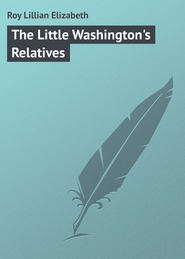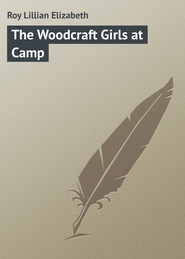По всем вопросам обращайтесь на: info@litportal.ru
(©) 2003-2024.
✖
Polly's Southern Cruise
Настройки чтения
Размер шрифта
Высота строк
Поля
“All right! Beel and Bob find me a seat in a Belgium peasant cart what drivin’ back home, and I sit like a nice beeg gurl on a seat and call her mudder. I find goot luck dat time, cause no Hun stop me and no one take the beeg dinner what Capataine pack for my family.
“Mebbe my mudder not cry tears for joy when I come in all dressed oop like my seester, and my seester she laff and say: ‘Now I got a fine new dress to wear.’
“Veil, I tell my mudder I got’ta go join Beel’s friend’s in dis fight. I find I beeg enuff to take prisoner by my enemy, so I beeg enuff to fight, too! My mudder cry, and my seester say. ‘Oh, vere shall we find help?’ En I say: ‘Leaf this old house ’cause soon it make fire for my enemy to cook peegs, and you run so fast what you can to my onkel’s in Bruges.’ So dey run an’ I coom back to fight wid Beel. And so dat’s all.”
As he concluded his story, Johann instantly stooped and took the abandoned tray. He quickly transferred its contents to the table and turned to hurry back to the kitchen without waiting for applause from his interested audience. At the same moment the Oriental chef came down the deck and brandished a long wooden spoon. Johann saw and grinned. He half turned to Mr. Dalken and said in a most laughable way: “My enemy cooms!”
Then he scuttled away down the other side of the craft, and the chef stood and shook an angry fist in his direction. But the Oriental heard the loud laughter from those seated at table, and saw their pleased faces and he surmised that Johann must have been the cause of it. Hence he hurried back to his culinary heaven to question the servant and learn what had so amused the guests.
“Jo hasn’t told half the story,” declared Bob, as the merry laughter subsided.
“No, he skipped anything that went to tell you what a loyal man he was, and how he fought for country as well as for us, his friends.” Bill seemed to go back and mentally review the incidents.
“Then it is up to you to tell us, Bill,” said Jack.
“Perhaps we have a hero with us who should have had a decoration. I believe in giving honor where honor is due, and Jo shall have everything that’s coming to him,” said Mr. Dalken.
“Well, the Croix de Guerre which I wear belongs to Jo, according to all rules of the game, but it fell to my lot to get it, and to Jo’s lot to get the shell in his leg,” said Bill. This caused a demand for the story, and Bill began.
“Bob and I volunteered at midnight to hunt on No Man’s Land for the officer who had important orders in the breast pocket of his uniform. He went out that afternoon with his men but was reported missing upon our return. No one saw him fall, nor had he been seen captured by the enemy with whom we had a mix-up. This was soon after Jo returned from home to link his future with that of the Canadian Troops.
“We managed to crawl unseen all over the same ground where we had the skirmish late that afternoon, but not a sign of the lieutenant could we see. Finally Bob lifted his head and nodded at what had seemed to me to be a heap of debris.
“‘It’s a ruin,’ whispered Bob. ‘I don’t remember seeing it there this evening.’
“‘You didn’t, Bob. It was a little barn when last we came out here,’ replied I.
“‘Then a shell must have smashed it since. Could the Left, have been near it, do you think?’ Bob’s tone suggested possibilities, so I silently agreed to follow him.
“We crept along, slowly and carefully, fearful of a surprise at any moment, for the enemy were out that night as well as others, and they might be seeking in this ruin, exactly as we purposed to seek for missing pals.
“We reached the heap of stones and plaster without interruption and then we felt we could breathe better. The barn fell so that some of the timbers caught in the ends of others and stuck up after the manner of loose jack straws. Under this small hollow pyramid was enough shelter for both of us, and we crept there hoping to hide and plan our return.
“To my horror I came in contact with a cold face, and after discreetly feeling over the body I found it to be a Hun. We heaved a sigh of relief to find it was not our Lefty. But close upon that relief came a shock: A groan from under the timbers.
“‘Look out for a surprise!’ warned Bob, and I nodded.
“But we had no time to lose in wariness, for immediately after the moan we heard a German cursing fluently. The voice was not the same. I soon made my way into the impromptu cave and there discovered our officer, pinned down by a timber and quite unconscious. It was his moan we had heard. Almost within arm’s reach of him, the Hun soldier was pinned down also, but he could not move his body even though he was mad to drive his spike into our Lefty’s unconscious heart.
“In a few shakes we had the German tied securely and the timbers lifted from our officer. Then we planned to return with the injured man upon our backs. The enemy we were hoping to drive before us into camp, but he objected so strenuously that we feared detection if we insisted. It was more important to get the officer back and leave the Hun. Yet we did not care to murder him in cold blood, and he refused to go quietly. We decided to bang him over the head with one of the logs, and when senseless we could drag him after us. Even this seemed unnecessary risk at the time, so we made him understand that we would shoot him down in his track if he refused to creep ahead of us as commanded. He knew that he ran the danger of fire from both sides should we be discovered on No Man’s Land, yet he was daring enough the moment we had started on our way to try and expose us to that double fire. In fact, he figured that there would be but one German less if all were killed, but there would be three men of his enemy’s side lost. But he failed in his little plot.
“We had not advanced ten feet, I was carrying the officer upon my back as I managed to worm my way after Bob, when we heard a small unit of Germans coming from the other direction. They, too, were creeping, creeping stealthily, in order to find their lost companions. Fortunately, we had gagged the Hun who went in advance of me, and he could not shout, but he could kick up such a racket on the ground with his feet that it must attract attention in the stillness of the night.
“That made Bob so mad that he stood right up, grabbed the Hun and hustled him back again to the ruin. I had no choice but to turn with my load and return also. We had hardly reached this comparative security when the Germans who were out to find their comrades, heard us and reached the spot we had just abandoned.
“‘They’ll be in here next!’ whispered Bob. ‘Got your gun ready?’
“I had placed the officer back under the low shelter of the fallen timbers, and then roped the Hun to a huge post, which had been a corner stud of the barn, leaving the gag in his mouth; his head and his arms secured, to prevent his chewing the ropes or fumbling with his harness. Then I took my station near the aperture by which any one would have to enter the ruin. Bob squatted on the other side of the heap.
“We had not long to wait. In only too short an interval, the heads of our enemy came into view. They were not as circumspect as Bob and I had been, for they did not advance with guns cocked and ready, hence I found it an easy matter to pluck the gun directly out of the hand of the first comer. At the same moment, as if he caught my idea, Bob fell upon him and closed his mouth with a big flat hand. The surprised man was so frightened that he forgot to yell for help, and his other two comrades came on without warning until it was too late to retreat.
“The captured man did give a cry but it was muffled and so unintelligible that his pals might have taken it to come from prisoners he had found within the ruin. But the two who followed the first capture were alert, and poked the muzzles of their rifles almost in my face without being able to see what they were up against. I dropped suddenly and rolled over against the hulk of the man who came first. The blow against his legs and in the pit of his stomach made him double over me and go headlong into the Hun who sat roped against the post. Instantly I was on him and had him at a disadvantage. It took but a jiffy to force back his arms and make him let go his clutch on the gun. I laughed at the simple task we had had, when right behind me sounded the report of a rifle. It was so close to my head that I jumped and let go the hold on my prisoner.
“But the bullet meant for me found its rest in the German I had just released. He rolled over with a groan, and I turned to fight the third man whose gun I thought had fired at me. To my astonishment I saw Johann in silent combat with the enemy. He had crept in just in time to see the Hun aim at me, and he had jumped the man so unexpectedly that the rifle went off wild and hit the wrong man.
“In a few seconds we had all the prisoners roped and willing to follow wherever we commanded – even to the ends of the earth. And Jo insisted upon taking our officer upon his own broad back. We managed to secure the Lieutenant to his back by means of bits of harness found in the ruins of the old barn, and having secured the important order in my own breast-pocket, we started out, driving the four prisoners before us.
“It was almost dawn when we reached our own line, and great was the welcome we got as we came in ‘bringing our sheaves with us.’ But, as I say, Bob and I got the medals, for doing what really Johann brought to a pass. Without his presence at the very moment when he was needed most, I would have been a dead man and Bob would have been at the mercy of three lively Huns. And it was Jo who turned the table for us.”
When Bill had finished his story, the girls cheered for Jo. He was just approaching with the next course, but when he saw all the eager smiling faces turned his way, and realized that Beel had told the story of the old ruins, he set the heavy tray upon the seat of a chair and fled. Scouts were sent to find him and bring him back, but not a trace of him could they see. He had found a better hiding place than his seester’s dress in which he had travelled back to his home in Belgium that day.
“Well, let’s finish our dinner, children, and then we will take up the hunt for Jo. It will be better fun than hunting the slipper,” remarked Mr. Dalken.
The dinner continued merrily, every one pleased at the discovery of a real hero on the crew of the yacht, and Mr. Dalken pleased to hear of Jo’s courage and simple childlike bravery without thought of recompense. But he also had a plan.
Later in the evening, while the young folks were dancing and trying their best to forget the warm climate of the Equator, Mr. Dalken slipped away and remained absent for some time. He had gone to find Jo and have a heart to heart talk with him.
Thus he learned that Jo had signed up to take this voyage in order to earn more money to send to his sister who now was in a French hospital in the north of France, suffering from nervous collapse and lack of nutrition. His aged mother had died from exposure at the time the enemy had swarmed over Belgium and had driven every native forth from home and friends.
“Well, Jo, I am going to communicate with a relative who is doing reconstruction work in France now, and I shall ask her to visit your sister and see if she is able to travel. If she is I shall send her the money to bring her over to you, and henceforth you shall work for me – not for the Captain, or the chef, or any other boss, but for me. Do you like the plan?”
Johann sat and stared for a few moments, then he jumped up and shouted. “Do I like heem! Oh, Meester Boss, I love heem! And my seek seester – ah, I love you, Beeg Boss!” And to Mr. Dalken’s astonishment Johann threw both arms about his neck and wept tears of joy upon the nice black dinner coat.
But Mr. Dalken never mentioned this to others, for he appreciated the embrace which came spontaneously from the heart of this great big giant of a young Belgian whose gratitude was unbounded. And he took Johann’s hand and shook it in a friendly way, to seal the compact. Just as he ended the hand-shaking, the chef came in.
“O-oh, Hon’able Master, muchee warm t’night! Most hon’able company feel plenty sweat mebbe – me pour nice cool jlink, eh, Hon’able Boss?”
“I wish you would, please, and throw in plenty of ice,” laughed Mr. Dalken, turning and leaving the little room.
“Come, now, Mos’ Hon’able So’jer in French – pour plenty ice for our Mos’ Hon’able Boss,” commanded the chef, thus placing Johann upon a pedestal from which he could look down upon all the other members of the crew thenceforth and forever. For the Oriental had heard the story of the medals and bowed down in hero worship and named Jo “Mos’ Hon’able Jo” thereafter. To the delighted Belgian it was as acceptable an honor as the medal was to “Beel.”
CHAPTER XIII – HIGH LIFE AT THE CANAL
After the first day at the Canal Zone, not one member of Mr. Dalken’s party had time in which to plan for anything beyond the Canal. Bill and Bob returned late that first night and reported to their companions at the Barracks that “Beeg Jo” was on board the White Crest; the officer who had been rescued and carried back to camp on Johann’s back during the world war was now one of the officers in charge of the American Post at Panama. Thus one can readily understand the result of such information.
All the second day the tourists were entertained by Bill and Bob, and were shown about the country in touring cars which had been pressed into service by the eager youths. Not only did the yacht-party see everything worth seeing at Colon and Cristobal, but they saw more of the country round about the Atlantic side of the Canal than most visitors do who land there.
After dinner that night the entire party was escorted to the Hop at Government Headquarters, where dancing formed the programme of the evening’s entertainment. The coolness of the air made the dancing all the more enjoyable, and the visitors declared they had never had such a pleasant time.
Before the ladies said good-night to return to the yacht the government men had promised them an aeroplane trip the next morning. Mr. Dalken demurred somewhat when it was first proposed, but his objections were soon overruled by the girls who were thrilled at the prospect of going up in a great army plane.
Finally it was agreed that Mr. Dalken with his two men friends should go up first and test the safety of the plane. If he felt assured that it was quite safe for younger persons he would consent to their going up.
The entire party made for the field where the hangars of the two ’planes were to be seen. One ’plane was a small affair which carried but two passengers, but the other ’plane was a large one with a capacity for seven passengers besides the engineer and his assistant.
The air sail of about twenty minutes was completed and Mr. Dalken landed again upon terra firma. It was his first flight of any distance or height, and he had enjoyed it thoroughly. He was enthusiastic in his praise of the manner in which the ’plane had been handled by the experienced men.
But a sudden darkness swept over the sky and the natives were seen to scamper off for shelter, while the officers and aeronauts hastened their guests to the hangars until the squall of rain should be over. It fell just as it had fallen one day at Jamaica; it came down in torrents for a few minutes, then the sun shone forth again in dazzling brightness.











